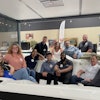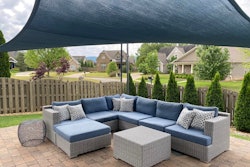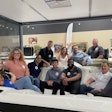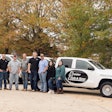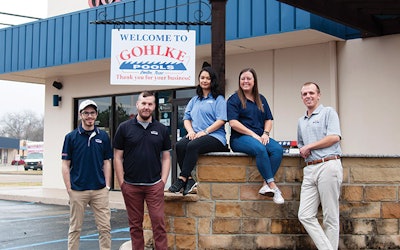
For pool and spa professionals, finding new employees to fill retail, service and construction jobs is an uphill battle. Even more difficult, however, is keeping them.
According to a study by the Center for American Progress, it can cost on average $3,328 to find, hire and train a new $10/hour retail employee. (Expect that figure to be significantly higher for service techs and construction workers who, even at entry level, require significant training and/ or certifications.) Turnover is to be expected in any field, but too much of it can put a serious dent in your profits.
Compounding matters is the much-discussed millennial generation that is flooding into these entry-level positions, bringing with them a set of priorities and expectations for the workplace far different than past generations.
How can managers in the pool and spa industry keep young people engaged? What would interest them enough to come back summer after summer — and even build a career in the pool and spa industry? Four managers share their thoughts.
INDEPENDENCE AND DEVELOPMENT
At DesRochers Backyard Pools & Spas, a family-owned company with three locations in Northern Illinois, you'll find Mallory Wachowski makes a strong case for the importance of company culture in helping employees view the pool and spa industry as a career rather than a pit stop.
Wachowski has been with the company since 2006, and unlike many of her peers, came to the industry without family ties. She started working at DesRochers part-time through college and, post-graduation, decided to pursue the work full time. Today Wachowski is the company's retail operations manager and travels from store to store to oversee the retail teams at each. She has also risen through the ranks on an industry-wide level: she was named one of APSP's 2018 Young Professionals of the Year and serves as the vice chairwoman of APSP's Retail Council.
"I love the pool and spa industry, but it mostly has to do with the way DesRochers runs its business," she says. "They have always supported me, helped me grow, given me opportunities to network and extra education. They have even given me opportunities to execute my ideas within their business. So I really like it because I have that freedom that you wouldn't have in a lot of other professions."
RELATED: Finding the Next Generation
In a 2016 Gallup poll, 87 percent of millennials reported professional development or career growth opportunities are "very important" to them in a job. For Wachowski, such opportunities can be as formal as off-site training and as informal as a general sense of trust and ownership over part of the business. As just one example, a seminar on social media led Wachowski to reevaluate her company's digital efforts, which ultimately led to a stronger presence.
"I came back [from the seminar] and just started executing new ideas about social media. I came up with a contest to get more followers and in turn created a little bit of a frenzy on our Facebook page," she says. "It was really rewarding because we ended up growing because of it and taking a different direction with social media, and [the owners] didn't feel the need to step in; I could do it on my own. I made the decision to try something new."
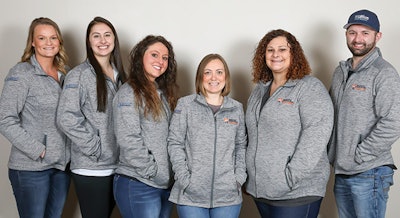 At DesRochers Backyard Pools & Spas, Brooke Rossi (third from right) and Mallory Wachowski (second from right) find that with encouragement, millennials can be a big asset to a company. (ELBE Photography by Lauren Broderick.)
At DesRochers Backyard Pools & Spas, Brooke Rossi (third from right) and Mallory Wachowski (second from right) find that with encouragement, millennials can be a big asset to a company. (ELBE Photography by Lauren Broderick.)
FOCUS ON FLEXIBILITY
At Gohlke Pools in Denton, Texas, you'll find more than 90 percent of the team is comprised of millennials. It helps that Denton is home to both the University of North Texas and Texas Woman's University, which together create a wellspring of young people looking for part-time work. As Gohlke Pools Office Manager Christy Horton has found, younger employees are increasingly looking for flexibility in their work, a benefit pool and spa service, unlike other fields, can provide.
"It is hard adjusting to their mentality because they're not a 7-4 or 8-5 type of employee. They like that flexibility," she says. "If they want to come in at 6 or they want to come in at 9 — just be open minded and give them a chance. Because usually they have proved me wrong."
This flexibility isn't about the chance to sleep in late (at least, not always). According to a study from Bankrate, about half of millennials have a "side hustle," or a job that helps generate a little extra income. (For example, several photos in this story were taken by Chevy Gil, who works part-time at Gohlke Pools while running a photography business on the side.)
"We do have a large portion of the staff that considers themselves musicians," says Nick Day, service manager at Gohlke Pools. "I don't think they make much money doing it, but if you asked them what their career was, they would tell you they're musicians. So they really like the flexibility of being able to come in, get the work done and get out for band practice or a gig. It makes it a lot easier for them to do what they're really passionate about."
DEFEAT BOREDOM
As with each generation, millennials — loosely defined as the generation born between the early '80s and mid- 90s — come with a fundamentally different set of values. At best, they can be described as "passionate" and "motivated," and at worst, "flippant" or "entitled."
"I think a lot of millennials get a bad rap, like they're lazy and have a bad work ethic, and that's really not the case," says Brooke Rossi, second-generation owner/principal at DesRochers. Rossi, a millennial herself, started working at the business under her parents in junior high school and took part-ownership with her brother, Brian DesRochers, in 2016. "It's just that they want to be challenged and they feel like if they're not challenged, they get bored, which sometimes shows as 'they don't care,' or 'they don't have a good work ethic.' But really they're just bored."
RELATED: The Next Generation Speaks
Millennials seek challenge and mental stimulation, both of which the pool and spa industry can provide in spades. Communicating that message to your staff can help keep your team interested and invested in the work.
"I think there are a lot of things millennials are really passionate about. I've noticed they care a lot about the environment, what they eat and things like that. They're more passionate and want to make a difference," she says. "And I think that's why it's easier for us to keep them motivated; it's not a boring job, like ringing stuff up at the grocery store — it's actually a challenge. And when they clean up a pool or help somebody, in a roundabout way they are making a difference in that person's life. That's something that's been beneficial for us. It's not a boring job; it's something you have to actually use your brain to do."
 The millennial generation thrives on independence. Offering ownership over certain tasks and some decision-making power helps them establish roots at your company. (Photo by Chevy Chey Photography.)
The millennial generation thrives on independence. Offering ownership over certain tasks and some decision-making power helps them establish roots at your company. (Photo by Chevy Chey Photography.)
PERTINENT PERKS
Thinking about the millennial workforce can conjure images of startup culture: free snacks and lunches, a ping-pong table in the break room. Some may roll their eyes at such benefits, but some pool and spa companies are finding these perks genuinely do support employee retention and a positive company culture.
At Gohlke Pools, for example, free lunches are provided once a month. A hair stylist comes in every couple of weeks for free haircuts. And since moving into a new location last year, Gohlke has hired a full-time mechanic to maintain the company's fleet of 30 service vehicles; employees can take their own cars to the company mechanic for deeply discounted oil changes and repairs.
"We're always looking for inexpensive options that provide a lot of value," Day says. "The mechanic is super beneficial. Remember back in your early 20s — if you ever had a car problem, it was a major ordeal for you. So we think that's very helpful to these people."
"We allow them to pay that out depending on how much it is," Horton adds. "And it also keeps them able to come to work if they do have a car issue that needs to be taken care of. They don't miss any time because their car is there."
Free haircuts may sound like an odd perk, but it's one that benefits both the employee and the company.
"The haircut thing, we just got really lucky," Horton says. "One of our employees, his girlfriend cuts hair. So we just pay her an hourly rate to come in once every couple of weeks and the guys can get their hair cut before they go out and start their day. It helps keep them clean and neat in appearance and keeps them from having to leave their shift early to go get their hair cut."
RELATED: Millennials Tell it Like it Is
And like the classic startup, Gohlke Pools does indeed have a game room with a pool table, ping pong and darts.
"I'll tell you I was not really for the game room thing," Horton says. "I'm over 45 and of the mind that 'you go to work and you go home,' and this generation is not like that. My concern was, of course, people playing on company time, but nobody abused it. And when you go over there, people will be playing in the morning sometimes before they go out for the day at 6:30 or 7, and they're all in there laughing and joking around.
"It made the summer a lot better last year. Summers are stressful, but it seemed like nobody got really aggravated with each other and the tension level seemed to be a lot better."
Financial rewards are motivating for just about anyone, young people especially. Like many pool and spa companies, DesRochers offers commission on certain items and a bonus for employee referrals who stay on for 90 days. More unusual are scholarships provided to the top salesperson (or person with the highest average sale, etc.); the company offers a $1,000 scholarship to the first-place winner and $500 to second place.
"I think it attracts candidates with higher potential because they were quite literally fighting over it this year," Wachowski says.
 Financial rewards are a big motivator for young people. Offering commission for service work and/or sales incentivizes a team to produce better results. (Photo by Chevy Chey Photography.)
Financial rewards are a big motivator for young people. Offering commission for service work and/or sales incentivizes a team to produce better results. (Photo by Chevy Chey Photography.)
OFFER RECOGNITION
Like Gohlke Pools, Wachowski and Rossi at DesRochers have learned you don't need expensive perks to keep employees engaged. With ideas like pizza parties starting to fizzle, they began getting more direct with their team members, asking them what they would ideally like as a reward for reaching a goal.
"I was really surprised by what they said," Wachowski says. A lot of it had more to do with recognition. Small things like gift cards or coffee. I think a lot of them, without saying it, really just want to know you noticed they achieved that goal."
That can be as small as genuine feedback on their work ("You did a great job handling that tricky customer today!") to small tokens that speak to them, like gift cards or coffee. Sometimes it's just a matter of recognizing their individuality.
"We did something where we gave out awards to 'Person who is most likely to eat at Jimmy Johns for work,' or 'Person most likely to listen to music their entire shift,' and that was awesome," Wachowski says.
THE BOTTOM LINE
By 2020, more than one in three adult Americans will be millennials. By 2025, millennials will comprise 75 percent of the workforce. It's a significant sea change in the workforce, and it's up to employers to keep up.
"I think in a lot of ways [millennials have] probably got it figured out," Horton says. "They want to work where they're happy. Money is important, but that's not the most important thing to them. You have to adjust to what they want."
RELATED: The Hard Truths About Attracting New Talent to the Pool Industry
For longtime industry pros more accustomed to traditional modes of management, it may be tough to change and meet millennials halfway. But if you don't, you may find yourself getting left behind.
"If you don't recognize where their strong points are, and you're not using those points to help motivate them," Wachowski says, "you will lose them."





















